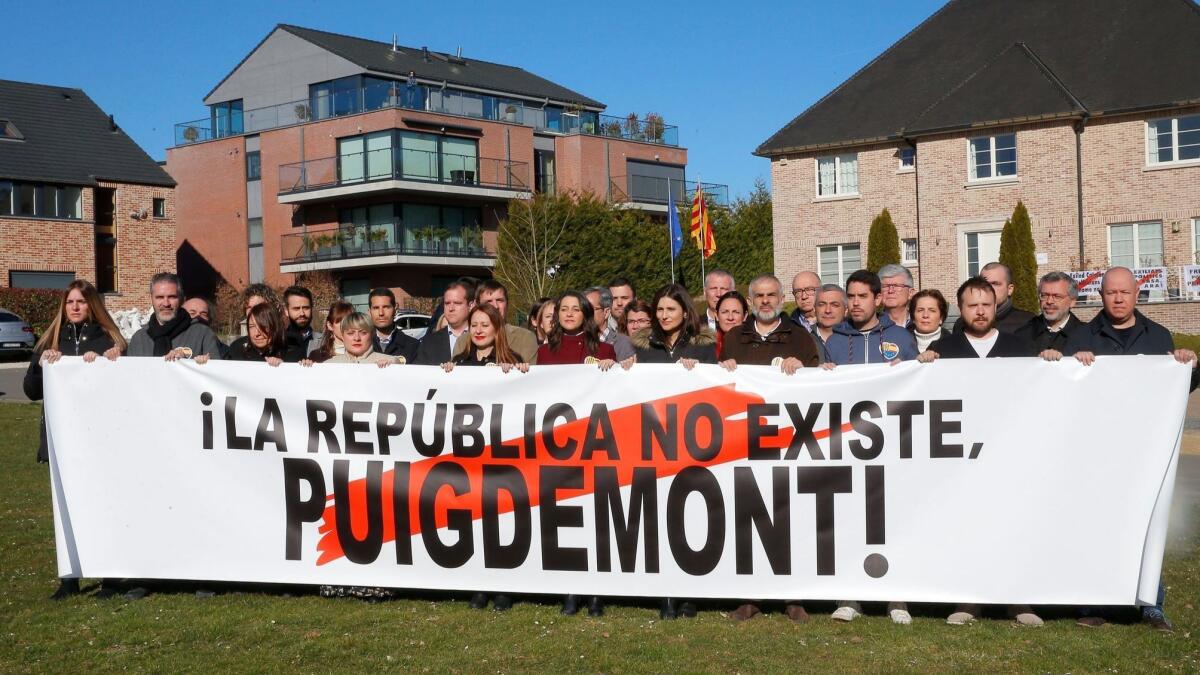Separatist Catalans on the lam from Spain establish ‘government in exile’ in Belgian house

- Share via
Reporting from WATERLOO, Belgium — The Catalans come in droves, carrying separatist flags and cameras to photograph the nondescript brick house on a quiet road in the town where Napoleon suffered his final defeat more than two centuries ago.
Some come bearing gifts — a painting, a bottle of wine. Others bring their children.
They make the 650-mile trek to Belgium to visit the house’s occupant: former Catalan President Carles Puigdemont, Spain’s best-known fugitive.
Puigdemont has called Waterloo home for the better part of a year, after having declared Catalonia independent from Spain in the wake of a successful October 2017 secession referendum — and then fleeing to avoid arrest.
He has since faced European Union warrants and spent 12 days in a German jail as Spain seeks to extradite him on charges of misuse of public funds and rebellion against the state for having organized the independence referendum, which drew 40% of eligible voters. The central government deemed the balloting unconstitutional and ordered it not be held.
A German court rejected Spain’s extradition request, declaring that a crime of rebellion must include violence, and that Puigdemont did not incite such behavior by holding the vote on independence, which was approved by 90% of those who did cast ballots. Spain rescinded an arrest warrant for Puigdemont in Belgium before a judicial ruling.
Consequently, Puigdemont and a growing group of colleagues have established what they call their “government in exile” in Waterloo and next door in Brussels to bring international attention to the cause of Catalan independence. And Puigdemont has converted the airy, six-bedroom house into an international headquarters of the separatist movement.
“If Europe doesn’t come to Catalonia, then I’ll go to Europe,” Puigdemont said recently in an interview in his living room.
For months after Puigdemont left Spain, his precise whereabouts were unknown. One day, he popped up buying candy in Ghent; another time, he was seen in a forest near Brussels. In February 2018, Belgian newspapers reported that he had rented the house, where he planned to reside full time and establish the Consell per la Republica, or Council for the Republic — what he calls the international seat of the Catalan independence movement.
The flight of the self-imposed exiles was thrown into stark relief last month as a contentious trial of 12 former leaders of the independence movement got underway in Spain’s Supreme Court. Several defendants, including former Catalan Vice President Oriol Junqueras, have been in detention for a year and face up to 25 years in prison if convicted.
The trial’s outcome could determine whether Puigdemont can ever return to Catalonia without facing arrest.
The Waterloo house, Puigdemont says, functions much like his old office at Catalan’s seat of government in downtown Barcelona. He spends his days videoconferencing with politicians in Catalonia and planning speeches across Europe. Each week, he receives journalists, diplomats and giddy Catalans eager to have him sign their Estelada, the blue, yellow and red Catalan separatist flag. Sometimes Spaniards opposed to Catalan independence protest on the lawn across the street.
Puigdemont says his goal is to bring the issue of Catalan self-determination to what is considered the unofficial capital of Europe, where it is more likely than in Spain to find a sympathetic audience.
“I didn’t want to hide,” he said. “I wanted a big spotlight…. If I had wanted a more comfortable exile, I would not be here.”
Critics counter that Puigdemont is a coward for having not faced the music.
“If this man had a minimum iota of dignity, he would be showing his face in Spain before the court for all of the misdeeds he has done,” said Ines Arrimadas, a member of the center-right party Ciudadanos, or Citizens, and leader of the opposition in the Catalan parliament, at a news conference in front of the Waterloo house recently.
Puigdemont says he has tried to make the suburban digs feel like a Catalan enclave in the middle of Francophone Belgium.
The home is decorated with Catalan flags and paintings depicting scenes from the referendum. He hosts calcotadas, typical southern Catalonia barbecues featuring grilled leeks dipped in romesco sauce. In November, he invited a team of castellers to visit, and they, in turn, asked him to form part of their human tower — a Catalan tradition that dates back hundreds of years.
“We are here looking at Catalonia. We are not Belgium,” Puigdemont said. “This space is clearly Catalan.”
Some nearby residents appear bothered by the disruptions caused by their controversial out-of-town neighbor, saying his mere presence has changed the face of a tranquil neighborhood.
“There are a lot of people” coming here, said Andre Troupee, 81. And “Catalan independence is not our problem.”
“We have enough with our own Flemish separatists,” he said.
Though Puigdemont’s aim is to bring more attention to Catalan independence, European leaders have, for the most part, declined to comment, calling the referendum and the ongoing trial a domestic Spanish matter.
“We have no role in this debate and our position is known and stated for years,” wrote a spokesperson for the European Commission in an email. “The issue at stake pertains to the internal constitutional and legal order of Spain.”
Also in exile in Belgium are Catalonia’s former Culture Minister Lluis Puig, former Health Minister Antoni Comin and former Agriculture Minister Meritxell Serret. Like Puigdemont, they travel across Europe and keep in touch daily with Catalan politicians still in Spain. Comin remains a representative in Catalonia’s parliament — but cannot set foot in Barcelona without facing arrest.
“There is no schedule when you’re in exile,” Puig said. “You work 24 hours a day seven days a week to try to be able to return.”
Comin brought his daughter and partner to Belgium, but Puigdemont and the others left their families behind. Puigdemont says he is wary of establishing roots in Waterloo before the trial of his compatriots ends.
“I’m in a provisional moment,” Puigdemont said. “My plan is to return tomorrow. If I could go back tomorrow, I would go back tomorrow.”
Other Catalans have fled to Switzerland or Scotland.
Puigdemont is not the first Catalan president to seek refuge abroad. In 1939, when the Spanish Civil War ended, President Lluis Companys took flight to France to avoid arrest by dictator Francisco Franco’s police. He was eventually extradited and executed.
Josep Tarradellas led a Catalan government in exile, based in Mexico, during Franco’s dictatorship.
Separatism has divided Catalans for decades, but the referendum has served only to deepen the fractures.
Snap elections for the Catalan parliament in December 2017 showed ongoing polarization over independence. Separatist parties won a plurality of seats, butCiudadanos, which favored Spanish unity, won the largest total number.
The issue of Catalan independence is sure to be a major theme in Spain’s April 28 general elections. Socialist Prime Minister Pedro Sanchez called for the elections after Congress rejected his 2019 budget. Catalan separatist lawmakers, frustrated at Sanchez’s unwillingness to approve a legal independence referendum, joined the center-right opposition — who accuse Sanchez of being too benign to separatists — to vote down the plan.
Meanwhile, thousands of people hold dueling protests for and against Catalan independence in Barcelona. Anti-independence protesters tear down separatist insignia across Catalonia; separatists do the same with pro-Spain flags and symbols.
And in Waterloo, one of Puigdemont’s neighbors, a Spaniard, has hung a Spanish flag over her front window in protest.
Bernhard is a special correspondent.
More to Read
Sign up for Essential California
The most important California stories and recommendations in your inbox every morning.
You may occasionally receive promotional content from the Los Angeles Times.










